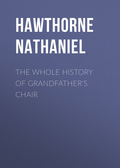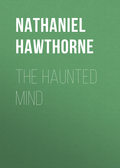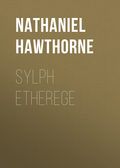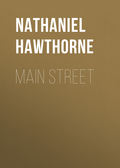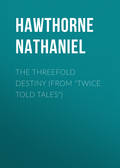
Натаниель Готорн
Fragments from the Journal of a Solitary Man
“I am possessed, also, with the thought that I have never yet discovered the real secret of my powers; that there has been a mighty treasure within my reach, a mine of gold beneath my feet, worthless because I have never known how to seek for it; and for want of perhaps one fortunate idea, I am to die
‘Unwept, unhonored, and unsung.‘
“Once, amid the troubled and tumultuous enjoyment of my life, there was a dreamy thought that haunted me, the terrible necessity imposed on mortals to grow old, or die. I could not bear the idea of losing one youthful grace. True, I saw other men, who had once been young and now were old, enduring their age with equanimity, because each year reconciled them to its own added weight. But for myself, I felt that age would be not less miserable, creeping upon me slowly, than if it fell at once. I sometimes looked in the glass, and endeavored to fancy my cheeks yellow and interlaced with furrows, my forehead wrinkled deeply across, the top of my head bald and polished, my eyebrows and side-locks iron gray, and a grisly beard sprouting on my chin. Shuddering at the picture, I changed it for the dead face of a young mail, with dark locks clustering heavily round its pale beauty, which would decay, indeed, but not with years, nor in the sight of men. The latter visage shocked me least.
“Such a repugnance to the hard conditions of long life is common to all sensitive and thoughtful men, who minister to the luxury, the refinements, the gayety and lightsomeness, to anything, in short, but the real necessities of their fellow-creatures. He who has a part in the serious business of life, though it be only as a shoemaker, feels himself equally respectable in youth and in age, and therefore is content to live and look forward to wrinkles and decrepitude in their due season. It is far otherwise with the busy idlers of the world. I was particularly liable to this torment, being a meditative person in spite of my levity. The truth could not be concealed, nor the contemplation of it avoided. With deep inquietude I became aware that what was graceful now, and seemed appropriate enough to my age of flowers, would be ridiculous in middle life; and that the world, so indulgent to the fantastic youth, would scorn the bearded than, still telling love-tales, loftily ambitious of a maiden’s tears, and squeezing out, as it were, with his brawny strength, the essence of roses. And in his old age the sweet lyrics of Anacreon made the girls laugh at his white hairs the more. With such sentiments, conscious that my part in the drama of life was fit only for a youthful performer, I nourished a regretful desire to be summoned early from the scene. I set a limit to myself, the age of twenty-five, few years indeed, but too many to be thrown away. Scarcely had I thus fixed the term of my mortal pilgrimage, than the thought grew into a presentiment that, when the space should be completed, the world would have one butterfly the less, by my far flight.
“O, how fond I was of life, even while allotting, as my proper destiny, an early death! I loved the world, its cities, its villages, its grassy roadsides, its wild forests, its quiet scenes, its gay, warm, enlivening bustle; in every aspect, I loved the world so long as I could behold it with young eyes and dance through it with a young heart. The earth had been made so beautiful, that I longed for no brighter sphere, but only an ever-youthful eternity in this. I clung to earth as if my beginning and ending were to be there, unable to imagine any but an earthly happiness, and choosing such, with all its imperfections, rather than perfect bliss which might be alien from it. Alas! I had not wet known that weariness by which the soul proves itself ethereal.”
Turning over the old journal, I open, by chance, upon a passage which affords a signal instance of the morbid fancies to which Oberon frequently yielded himself. Dreams like the following were probably engendered by the deep gloom sometimes thrown over his mind by his reflections on death.
“I dreamed that one bright forenoon I was walking through Broadway, and seeking to cheer myself with the warm and busy life of that far-famed promenade. Here a coach thundered over the pavement, and there an unwieldy omnibus, with spruce gigs rattling past, and horsemen prancing through all the bustle. On the sidewalk people were looking at the rich display of goods, the plate and jewelry, or the latest caricature ill the bookseller’s windows; while fair ladies and whiskered gentlemen tripped gayly along, nodding mutual recognitions, or shrinking from some rough countryman or sturdy laborer whose contact might have ruffled their finery. I found myself in this animated scene, with a dim and misty idea that it was not my proper place, or that I had ventured into the crowd with some singularity of dress or aspect which made me ridiculous. Walking in the sunshine, I was yet cold as death. By degrees, too, I perceived myself the object of universal attention, and, as it seemed, of horror and affright. Every face grew pale; the laugh was hushed, and the voices died away in broken syllables; the people in the shops crowded to the doors with a ghastly stare, and the passengers oil all sides fled as from an embodied pestilence. The horses reared and snorted. An old beggar-woman sat before St. Paul’s Church, with her withered palm stretched out to all, but drew it back from me, and pointed to the graves and monuments in that populous churchyard. Three lovely girls whom I had formerly known, ran shrieking across the street. A personage in black, whom I was about to overtake, suddenly turned his head and showed the features of a long-lost friend. He gave me a look of horror and was gone.



